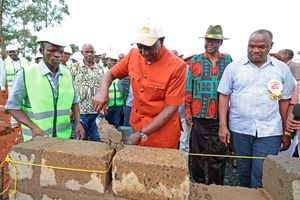Breaking News: Former Lugari MP Cyrus Jirongo dies in a road crash

A section of the Affordable Housing Project in Mukuru, Nairobi on December 11, 2024.
The affordable housing programme (AHP) has cut the productivity of Kenya’s construction industry as businesses halt projects to give way to the State’s initiative amid a slow start by the government, Parliament’s Budget Office has warned.
It says as most of the housing levy deductions from Kenyan workers idle at the affordable housing board accounts, players in the construction industry are not putting their money into new developments.
This has exposed inefficiencies in operations of AHP, turning the spotlight on the government which planned to deliver 200,000 houses annually but has managed just 1.2 percent of target two years later. “The anticipated active role of public investment in the construction industry may have impacted the private investments in the sector, thereby reducing the overall contribution of the sector to the GDP as well as a reduction in credit to the private sector for the building and construction sector,” PBO notes in a new report.

An affordable housing project in Ngara, Nairobi, on December 4, 2020.
This comes as the Kenya National Bureau of Statistics (KNBS) in the 2024 third quarter GDP report listed construction among sectors that pulled down Kenya’s economic growth, from six per cent to four per cent.
In the quarter to September 2024, construction sector contracted by two per cent with key indicators such as cement use and production of galvanised sheets falling, the GDP report noted.
“Cement consumption declined by 10 per cent to stand at 2,196.7 thousand tonnes in the third quarter of 2024, from 2,439.7 thousand tonnes consumed in a similar quarter of 2023. Similarly, the production of galvanised sheets declined by 4.2 per cent to stand at 68,719.5 metric tonnes in the quarter under review,” KNBS stated.
It also noted that credit extended to enterprises in the construction sector dropped from Sh149.6 billion in the third quarter of 2023 to Sh129.2 billion during a similar quarter last year, a trend the PBO has cited as having been caused by the decision by private sector developers to pump money into new constructions.
The PBO report points to the fact that following launch of the government’s AHP, private developers went slow on new constructions to avoid a lack of market on houses they build, and banks have also been slow to lend to such developers on default fears.
But while private developers apply brakes on new constructions, the government is struggling with idle funds.

Houses in the affordable housing programme being constructed at Bondeni Estate in Nakuru Town East.
The report assessing government plans on different projects under the 2025 Budget Policy Statement (BPS) notes that this has had a huge impact on Kenya’s construction industry.
“These resources are either idle in the fund or invested in government securities. This is an indication of systemic inefficiencies in the implementation of the programme,” the PBO report says.









